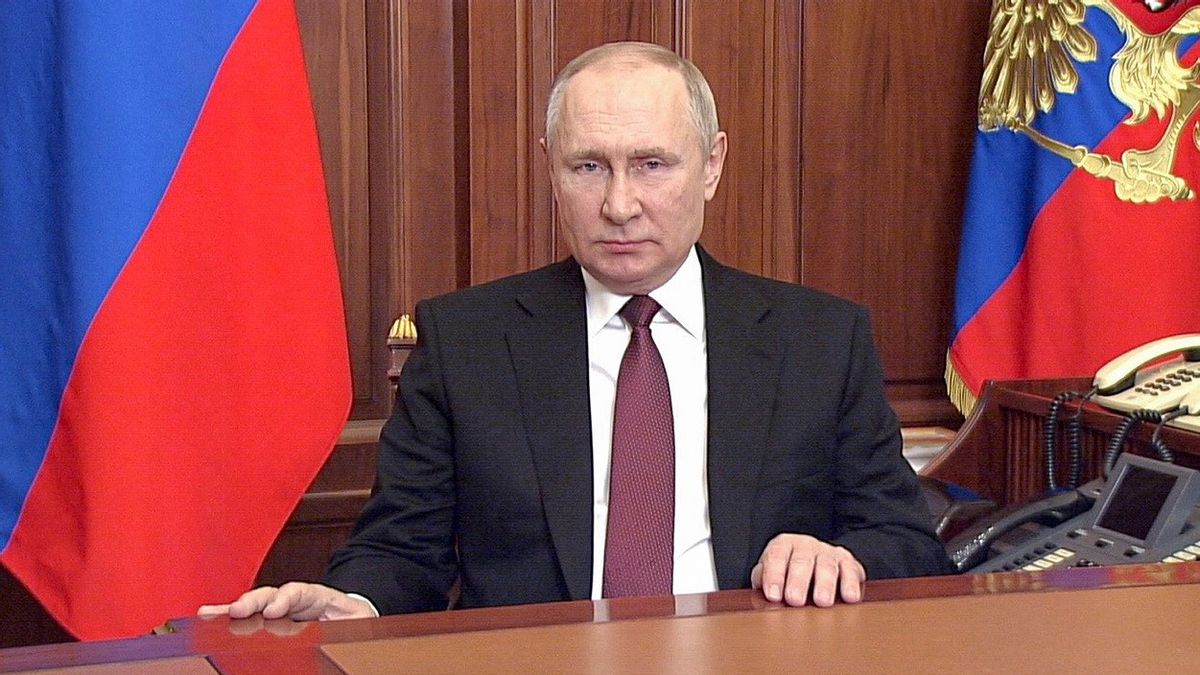JAKARTA - Russia plans to implement payments in rubles for gas sold to "unfriendly" countries, President Vladimir Putin said on Wednesday, with European gas prices soaring on fears the move would exacerbate the region's energy crisis.
European countries and the United States have imposed tough sanctions on Russia since Moscow sent troops to Ukraine on February 24. However, Europe relies heavily on Russian gas for heating and electricity generation, leaving the EU torn over whether to sanction Russia's energy sector.
President Putin's message is clear: If you want our gas, buy our currency. It remains unclear whether Russia has the power to unilaterally amend the current contract, which is agreed in euros.
The ruble briefly jumped after the surprise announcement to a three-week high past 95 against the dollar. It pared gains but remained well below 100, closing at 97.7 against the dollar, down more than 22 percent since Feb. 24.
Some European wholesale gas prices rose by as much as 30 percent on Wednesday, with UK and Dutch wholesale gas prices soaring. Russian gas accounts for about 40 percent of Europe's total consumption. EU gas imports from Russia this year fluctuated between 200 million to 800 million euros per day.
"Russia will continue, of course, to supply natural gas according to volumes and prices, staying within the previously agreed contracts," President Putin said at a televised meeting with government ministers.
"The changes will only affect the payment currency, which will be converted into Russian rubles," he said.
Separately, German Economy Minister Robert Habeck called Putin's request a breach of contract and other Russian gas buyers echoed the point.

"This would be a violation of the payment rules included in the current contract," said a senior Polish government source, adding Poland had no intention of signing a new contract with Gazprom after their existing deal expires at the end of this year.
Not only that, big banks are reluctant to trade Russian assets, further complicating Putin's request.
Meanwhile, a spokesman for Dutch gas supplier Eneco, which buys 15 percent of its gas from a subsidiary of Russian gas giant Gazprom, Wingas GmbH, said it had long-term contracts denominated in euros.
"I can't imagine we would agree to change that provision," he said.
According to Gazprom, 58 percent of natural gas sales to Europe and other countries as of January 27, were settled in euros. The US dollar accounts for about 39 percent of gross sales and the pound about 3 percent. It is known, commodities traded around the world are mostly traded in US dollars or euros, which make up about 80 percent of the world's currency reserves.
"There is no danger for (gas) supply, we have checked, there are financial partners in Bulgaria who can realize transactions also in rubles," Energy Minister Alexander Nikolov told reporters in Sofia.
"We anticipate all kinds of actions on the verge of being unusual, but this scenario has been discussed, so there is no risk for payments under existing contracts."
Several companies, including oil and gas companies Eni, Shell and BP, RWE and Uniper, Germany's biggest importer of Russian gas, declined to comment.
"It's not clear how easy it will be for European clients to shift their payments to rubles, given the scale of this purchase," said Leon Izbicki, associate at consultancy Energy Aspects.
He said, however, Russia's central bank could provide additional liquidity to the foreign exchange market which would allow European clients and banks to get the rubles they need.
President Putin stressed that the government and central bank have one week to find a solution on moving operations to Russian currency, with Gazprom to be ordered to make appropriate changes to the contract.
On the gas market on Wednesday, the eastward flow of gas via the Yamal-Europe pipeline from Germany to Poland declined sharply, data from pipeline operator Gascade showed.
The European Commission said it plans to reduce the EU's dependence on Russian gas by two-thirds this year, ending its dependence on Russian supplies "well before 2030."
However, unlike the United States and Britain, the European Union countries do not sanction Russia's energy sector.
Russia has compiled a list of 'unfriendly' countries according to those that have imposed sanctions. Agreements with companies and individuals from these countries must be approved by government commissions.
These countries include the United States, member countries of the European Union, Britain, Japan, Canada, Norway, Singapore, South Korea, Switzerland, and Ukraine. Some, including the United States and Norway, do not buy Russian gas.
The United States is consulting with allies on this issue and each country will make its own decisions, a White House official told Reuters. The United States has previously banned Russian energy imports.
The English, Chinese, Japanese, Arabic, and French versions are automatically generated by the AI. So there may still be inaccuracies in translating, please always see Indonesian as our main language. (system supported by DigitalSiber.id)













